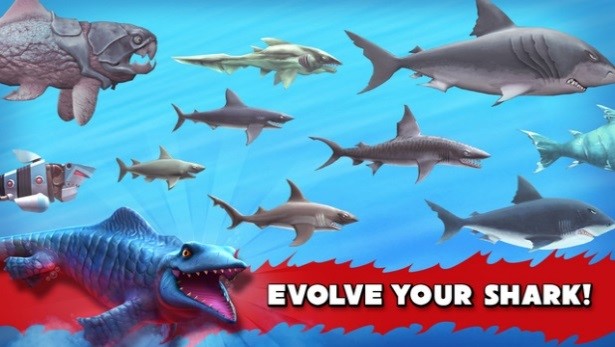By Guest Blogger: Rob Catalano, MA – Senior Learning Consultant at Bravo Wellness
So how do you use effectance motivation to keep your learners’ skills up to date, without them getting bored? Well let me share my fish tail, er, tale.
It took my wife a few years (ok, more than a few years) to get me to use a smart phone. Of course, now what do I do with it? That’s right, play games – several and often! Some of these games are your standard old school fare like backgammon. However, there is a newer one I’ve been playing almost every day for the past year – Hungry Shark Evolution!
The premise of the game is that you start as a small Reef shark swimming along and eating as much you can without getting eaten yourself. As you eat more and last longer, you grow in size, evolving into the next biggest shark, all the way past a Great White up to the ultimate shark, Alan the Destroyer of Worlds (don’t ask, just play).
You master new skills and strategies as you evolve from shark to shark, earning points and coins you can use to purchase various accessories, extra lives, and even baby sharks (they’re so cute – and deadly!). The game’s design uses effectance motivation to keep you wanting to earn enough each time you play to see progress towards evolving to the next shark. Fast forward to me evolving to Alan the Destroyer. At this point, there isn’t much challenge anymore, so you stop playing as often. Then one day, you notice – wait for it…a challenge!
Now, this sounds interesting. Can I swim with the best from the school of sharks of the seven seas? What is this challenge? Even though each challenge has a certain award based on how you fare against players from around the world, everyone who participates earns something. They tend to give the biggest award to the top 1% of players, then top 5%, 10%, and so on. The key is, they show your ranking after each round of play to see how you stack up against other players. If I only eat another 50 minnows, I can be in the top 10% and move ahead of Player Bruce123 from Long Island!
Effectance motivation is basically your desire to achieve something—that is, to be effective.
So how does this apply to training design? Think of topics that you train that are needed, but not used often. Learners get rusty or tend to rely on whatever method they first learned, even though a different method might be better in a given situation.
For example, we just had a workshop on how to meet with employees who work remotely using our company’s various available technologies. Some learners rarely need to work remotely, so their eyes were opened to what the technologies they could harness. Others, who relied on one technology daily, didn’t even know there were other options that might work better in some situations. Based on their feedback, we’re going to design future workshops and challenges that set specific meeting goals using certain criteria, including constraints. This way learners are periodically using new technologies and skills, while reinforcing what they already know. And yes, we will use rankings and awards, but no actual penguins will be harmed.
For more information on effectance motivation, you can start here:
1. What is Effectance Motivation http://www.adviseamerica.com/what-is-effectance-motivation/
2. How to Use Motivation Theories to Help Improve Team Performance www.educational-business-articles.com/motivation-theories
3. Using Effectance to Better Motivate Yourself and Others: How to make work more like a video game www.slideshare.net/BizLib/using-effectance-to-better-motivate-yourself-and-others-how-to-make-work-more-like-a-video-game
Challenge, accepted – now start eating minnows and penguins!
By Rob Catalano, MA
Senior Learning Consultant / Bravo Wellness


